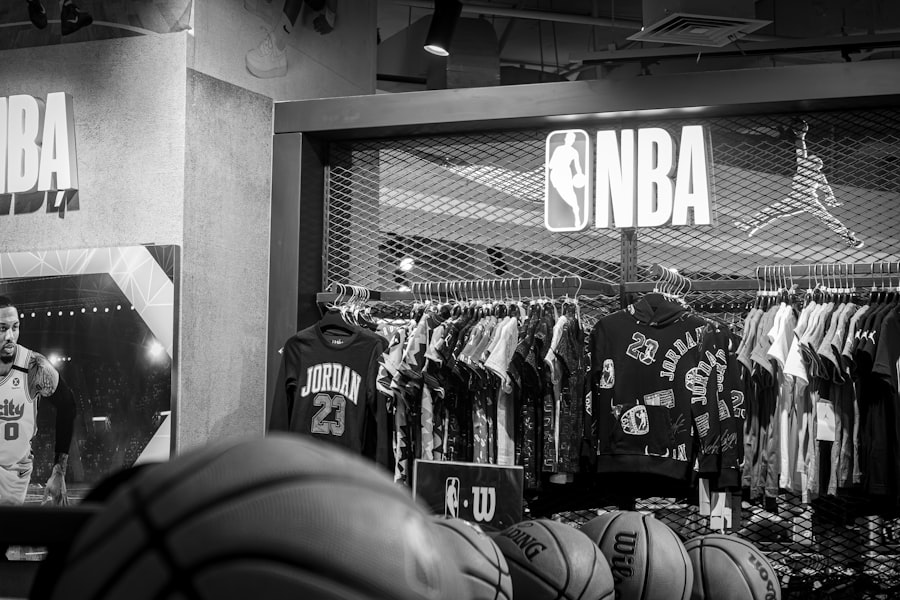The world of professional basketball is not solely defined by the players on the court; it is also shaped significantly by the agents who represent them. NBA agents serve as the crucial intermediaries between players and teams, negotiating contracts, securing endorsement deals, and managing the overall careers of their clients. The role of an agent has evolved over the years, becoming increasingly complex as the business of basketball has grown.
With the advent of social media and the rise of player empowerment, agents now find themselves navigating a landscape that requires not only negotiation skills but also a deep understanding of branding, marketing, and public relations. In the context of the National Basketball Association (NBA), agents are often seen as the unsung heroes behind a player’s success. They work tirelessly to ensure that their clients receive fair compensation for their talents while also helping them build a sustainable career beyond their playing days.
The relationship between an agent and a player is built on trust and mutual respect, as agents often have significant influence over a player’s career trajectory. This article delves into the multifaceted role of NBA agents, exploring their responsibilities, challenges, and the evolving nature of their profession in the fast-paced world of professional basketball.
Key Takeaways
- NBA agents play a crucial role in managing players’ careers both on and off the court.
- They handle contract negotiations, endorsement deals, and brand management for their clients.
- Top agents represent high-profile players and influence major NBA transactions.
- Agents assist players through critical phases like the NBA Draft and free agency periods.
- The profession faces challenges and is evolving with changes in the basketball industry and player needs.
The Role of NBA Agents in Professional Basketball
NBA agents play a pivotal role in shaping the careers of professional basketball players. Their primary responsibility is to negotiate contracts with teams, ensuring that players receive competitive salaries that reflect their skills and market value. This involves not only understanding the nuances of collective bargaining agreements but also being well-versed in the financial landscape of the NBAgents must analyze market trends, salary cap implications, and team needs to craft deals that are beneficial for their clients.
For instance, when negotiating a contract for a player like LeBron James, an agent must consider not just the immediate financial implications but also how the deal affects the player’s legacy and future opportunities. Beyond contract negotiations, agents are also responsible for guiding their clients through various aspects of their professional lives. This includes advising players on career decisions, such as whether to sign with a particular team or pursue free agency.
Agents often have extensive networks within the league, allowing them to provide valuable insights into team dynamics and organizational cultures. Additionally, they help players navigate off-court opportunities, including endorsements and business ventures. The role of an NBA agent is thus multifaceted, requiring a blend of negotiation prowess, strategic thinking, and interpersonal skills to effectively advocate for their clients.
Top NBA Agents and Their Clients

The landscape of NBA agents is populated by several prominent figures who have made significant impacts on the league through their representation of high-profile players. One such agent is Rich Paul, founder of Klutch Sports Group, who has become synonymous with player empowerment in recent years. Paul represents some of the biggest names in basketball, including LeBron James, Anthony Davis, and Draymond Green.
His approach to representation emphasizes not only securing lucrative contracts but also fostering a sense of agency among players regarding their careers and decisions. Paul’s influence extends beyond his clients; he has played a crucial role in shaping discussions around player movement and free agency. Another notable figure in the realm of NBA representation is Scott Boras, who is often regarded as one of the most powerful agents in sports.
While primarily known for his work in Major League Baseball, Boras has made inroads into basketball representation as well. His clients include several NBA players who seek his expertise in contract negotiations and endorsements. The success of these top agents is often attributed to their ability to build strong relationships with both players and team executives, allowing them to navigate complex negotiations effectively.
The impact of these agents on their clients’ careers cannot be overstated; they often serve as trusted advisors who help shape not only financial outcomes but also long-term career trajectories.
Negotiating Contracts and Endorsement Deals
| Metric | Description | Typical Range | Importance |
|---|---|---|---|
| Contract Length | Duration of the contract in years | 1 – 5 years | High |
| Compensation Structure | Fixed fee, performance bonuses, royalties, or combination | Varies by deal | High |
| Exclusivity Clause | Whether the endorser can work with competing brands | Exclusive or Non-exclusive | Medium |
| Performance Metrics | Sales targets, social media engagement, or other KPIs | Defined per contract | High |
| Termination Conditions | Conditions under which contract can be ended early | Cause, convenience, or mutual agreement | High |
| Rights and Usage | Scope of rights granted for use of name, image, and likeness | Limited or broad | High |
| Renewal Options | Terms for contract extension or renewal | Optional or automatic | Medium |
| Legal Fees | Costs associated with contract negotiation and review | Varies | Medium |
| Endorsement Value | Estimated market value of the endorsement deal | Varies widely | High |
Negotiating contracts in the NBA is a complex process that requires a deep understanding of both the league’s collective bargaining agreement and individual team dynamics. Agents must be adept at assessing a player’s value based on performance metrics, market demand, and potential future contributions to a team. For example, when negotiating a contract for a rising star like Luka Dončić, an agent must consider not only his current performance but also his potential for growth and impact on the franchise’s success.
This involves presenting data-driven arguments to team executives while also leveraging market trends to secure the best possible deal. In addition to contract negotiations, agents are instrumental in securing endorsement deals for their clients. The endorsement landscape has transformed dramatically in recent years, with players now able to leverage their social media presence and personal brands to attract lucrative partnerships.
Agents must navigate this evolving terrain by identifying potential brand partnerships that align with their clients’ values and public personas. For instance, when negotiating an endorsement deal for a player like Stephen Curry, an agent would consider not only financial compensation but also how the partnership enhances Curry’s brand image and resonates with his fan base. The ability to balance these factors is crucial for agents seeking to maximize their clients’ earning potential both on and off the court.
Managing Player’s Public Image and Brand
In today’s digital age, managing a player’s public image has become an essential aspect of an NBA agent’s responsibilities. Social media platforms provide players with unprecedented access to fans but also expose them to scrutiny and criticism. Agents must work closely with their clients to cultivate a positive public persona while mitigating any potential controversies that may arise.
This involves crafting strategic messaging around key events—such as contract signings or community initiatives—and ensuring that players engage with fans in a manner that aligns with their brand identity. Moreover, agents often collaborate with public relations professionals to develop comprehensive branding strategies for their clients. This can include everything from creating personal websites to managing social media accounts and organizing community outreach programs.
For example, when representing a player like Kevin Durant, an agent would focus on highlighting Durant’s philanthropic efforts alongside his on-court achievements to create a well-rounded public image. By effectively managing a player’s brand, agents can help secure endorsement deals that resonate with consumers while also enhancing the player’s legacy within the sport.
Navigating the NBA Draft and Free Agency

The NBA Draft represents a critical juncture in a player’s career, and agents play an integral role in preparing their clients for this pivotal event. From evaluating potential draft positions to advising on pre-draft workouts and interviews, agents must ensure that their clients are well-prepared to make a strong impression on team executives. This preparation often includes conducting mock interviews, analyzing team needs, and providing insights into how different franchises may view a player’s skill set.
Once the draft concludes, agents shift their focus to free agency—a period that can significantly impact a player’s career trajectory. Navigating free agency requires strategic planning and timing; agents must assess market conditions while also considering their clients’ preferences regarding team fit and long-term goals. For instance, when representing a player entering free agency after a breakout season, an agent must balance securing a lucrative contract with finding a team that offers opportunities for growth and success.
The ability to navigate these complex dynamics is essential for agents seeking to maximize their clients’ potential during this critical phase of their careers.
Challenges and Controversies in NBA Agent Representation
The world of NBA representation is not without its challenges and controversies. One significant issue is the prevalence of unethical practices within the industry, including conflicts of interest and exploitation of young players. Some agents may prioritize their financial gain over their clients’ best interests, leading to detrimental decisions that can impact a player’s career trajectory.
Additionally, there have been instances where agents have faced scrutiny for engaging in illegal recruiting practices or providing improper benefits to players during their college years. Another challenge facing NBA agents is the increasing pressure from players themselves for transparency and accountability. As players become more informed about their rights and options within the league, they expect their agents to provide clear communication regarding contract negotiations and endorsement opportunities.
This shift has led to heightened expectations for agents to be not only skilled negotiators but also effective communicators who can build trust with their clients. Navigating these challenges requires agents to maintain high ethical standards while adapting to the evolving landscape of player representation.
The Future of NBA Agent Representation in Professional Basketball
As the landscape of professional basketball continues to evolve, so too will the role of NBA agents. The rise of technology and data analytics is transforming how contracts are negotiated and how player performance is evaluated. Agents will need to embrace these advancements by leveraging data-driven insights to advocate for their clients effectively.
This shift may lead to more transparent negotiations as teams increasingly rely on analytics to assess player value. Furthermore, as player empowerment continues to gain momentum within the league, agents will play an essential role in facilitating this movement. Players are increasingly taking control of their careers by demanding trades or choosing where they want to play based on personal preferences rather than solely financial considerations.
Agents will need to adapt by developing strategies that align with this new paradigm while ensuring that they continue to advocate for their clients’ best interests. In conclusion, NBA agents are integral figures within professional basketball who navigate complex negotiations, manage public images, and guide players through pivotal career decisions. As the industry evolves, so too will the responsibilities and challenges faced by these representatives, making it imperative for them to stay ahead of trends while maintaining ethical standards in their practice.



